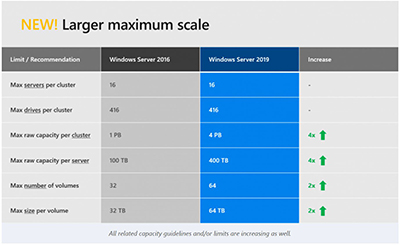News
Windows Server 2019 To Support 4PB Storage Spaces Direct Pools
Microsoft this week summarized the top Storage Spaces Direct improvements that will be coming to Windows Server 2019.
Storage Spaces Direct is a way of pooling disk storage, but it isn't new. It's been available with the current flagship Windows Server 2016 Datacenter edition product, evolving from an earlier Storage Spaces feature in Windows Server 2012. However, with the coming Windows Server 2019 product, Microsoft plans to double and even quadruple some of its capabilities, according to a description by Cosmos Darwin, a Microsoft program manager for Windows Server, in a Wednesday announcement.
Darwin summarized Windows Server 2019 storage highlights from Tuesday's Windows Server Summit Web presentation, which is currently available on demand.
4PB Pools
Microsoft plans to quadruple the storage of Storage Spaces Direct with Windows Server 2019. It'll support 4PB [petabyte] pools, compared with 1PB pools with Windows Server 2016.
Storage Spaces Direct is defined as "software-defined shared nothing storage." It creates a pool of storage using the disks in a cluster, with new disks getting automatically added to the pool. Organizations can benefit from Storage Spaces Direct by tapping a collection of less expensive storage devices, such as NVMe, SATA and SDD.
In addition to the expanded pooled storage, Microsoft expects to double the volume numbers and sizes that can be supported with Windows Server 2019. Darwin illustrated that point in the following table:
 [Click on image for larger view.]
Storage Spaces Direct scale improvements in Windows Server 2019 (source: June 27 Microsoft blog).
[Click on image for larger view.]
Storage Spaces Direct scale improvements in Windows Server 2019 (source: June 27 Microsoft blog).
Two-Node Support with USB Witness
There are two uses envisioned for Storage Spaces Direct, according to a Microsoft "Overview" document. Storage Spaces Direct can be used to support scale-out file servers, with storage and compute operations located in separate clusters. Alternatively, Storage Spaces Direct can be used in a "hyperconverged infrastructure," where compute and storage are combined in a cluster. This latter scenario is conceived as a cost-saving approach for smaller organizations or organizations with branch offices.
Storage Spaces Direct can support scaled-down infrastructure to just two nodes. Darwin, though, explained that a "tie-breaker mechanism to achieve quorum and guarantee high availability" is needed in such cases. He noted that organizations using Windows Server 2019 will have a cheap option for setting up such a tie breaker by adding "a simple USB thumb drive as the witness."
"This [thumb drive witness capability] makes Windows Server the first major hyper-converged platform to deliver true two-node clustering, without another server or VM, without Internet, and even without Active Directory," Darwin explained.
The USB thumb drive serves as "a low-cost quorum solution that works anywhere." It might be used by organizations that have remote sites that lack Internet connections or file shares.
Latency Detection and Mirroring
Darwin also highlighted a "built-in outlier detection for Storage Spaces Direct" in Windows Server 2019. It will automatically detect drives in a pool that are exhibiting abnormal behavior. It's conceived as a way of safeguarding against potential latency issues.
Organizations also will be getting the ability to balance volumes using a "mirror-accelerated parity" capability that has been improved in Windows Server 2019, Darwin noted. A volume can be created with both mirror and parity capabilities, and the performance has been doubled in Windows Server 2019 compared with Windows Server 2016, he indicated.
Partner Support
Darwin also touted increased partner hardware support for the software-defined capabilities of Windows Server 2019. Software-defined certification efforts are important for supporting the Storage Spaces Direct feature in hardware products. Inspur and NEC are the latest partners that have joined Microsoft's software-defined program for Windows Server. Others include DataOn, Dell EMC, Fujitsu, Hewlett Packard Enterprise, Lenovo, QCT and Supermicro.
The number of Windows Server products offered by Microsoft's hardware partners has about doubled since September, from 17 products to 33 products currently, he added.
About the Author
Kurt Mackie is senior news producer for 1105 Media's Converge360 group.